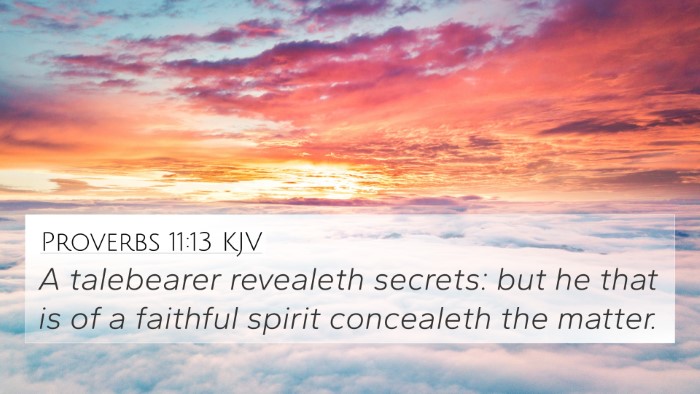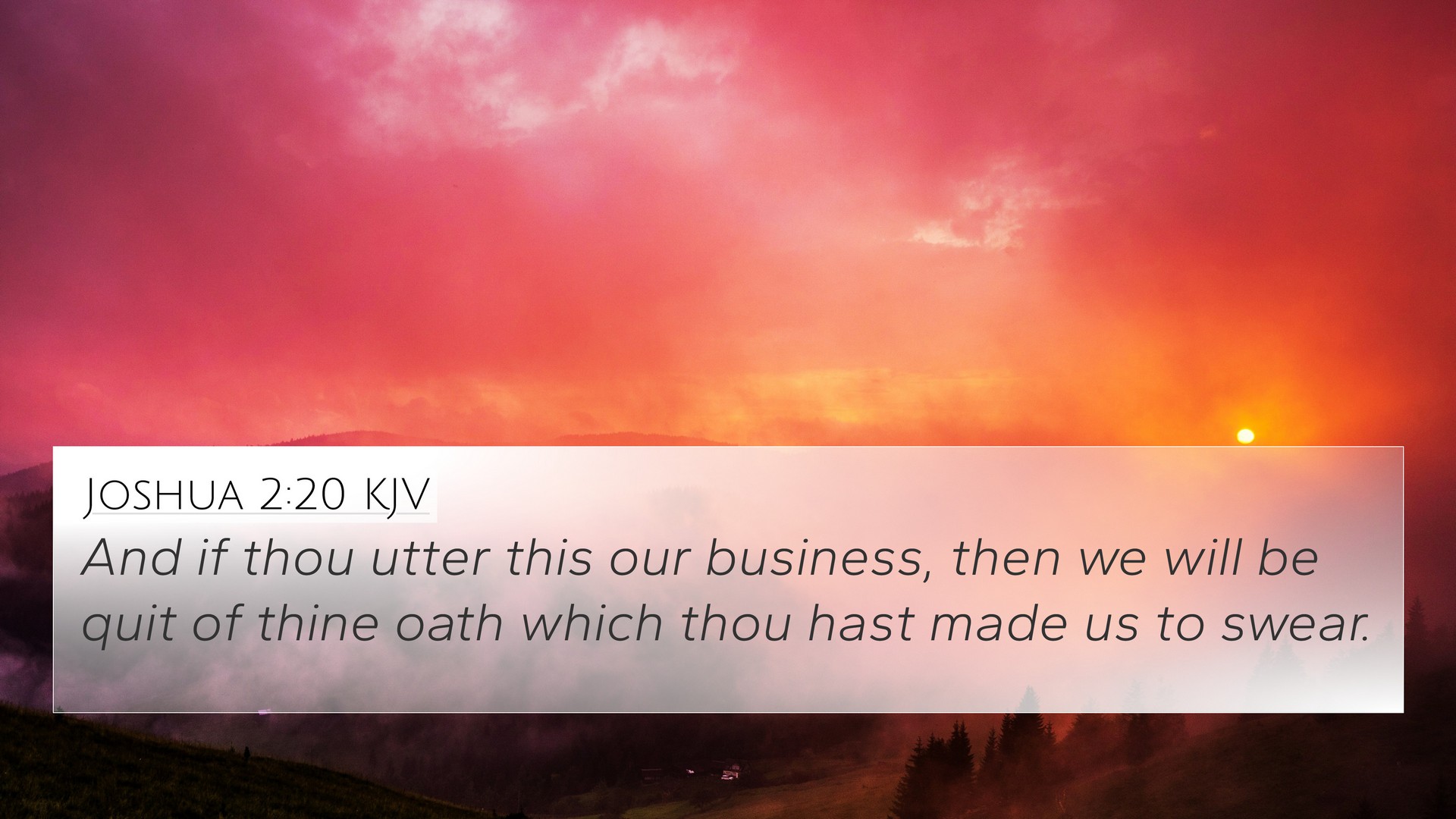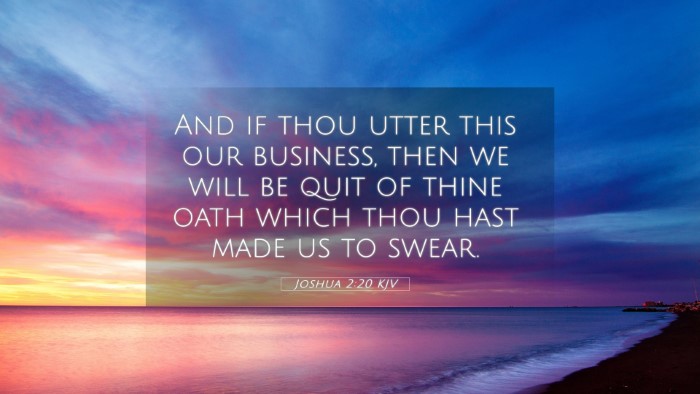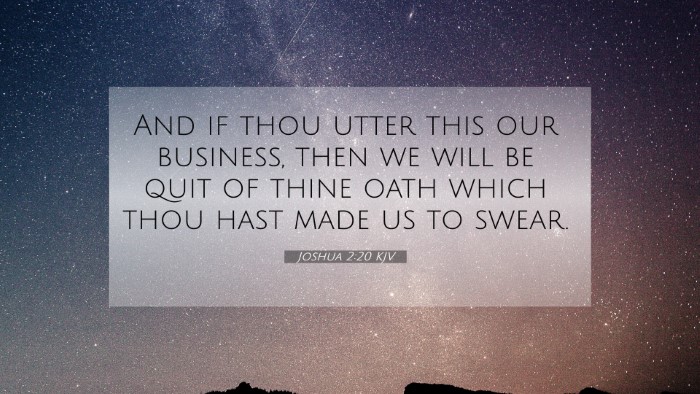Old Testament
Genesis Exodus Leviticus Numbers Deuteronomy Joshua Judges Ruth 1 Samuel 2 Samuel 1 Kings 2 Kings 1 Chronicles 2 Chronicles Ezra Nehemiah Esther Job Psalms Proverbs Ecclesiastes Song of Solomon Isaiah Jeremiah Lamentations Ezekiel Daniel Hosea Joel Amos Obadiah Jonah Micah Nahum Habakkuk Zephaniah Haggai Zechariah MalachiJoshua 2:20 Similar Verses
Joshua 2:20 Cross References
And if thou utter this our business, then we will be quit of thine oath which thou hast made us to swear.
Uncover the Rich Themes and Topics of This Bible Verse
Listed below are the Bible themes associated with Joshua 2:20. We invite you to explore each theme to gain deeper insights into the Scriptures.
Joshua 2:20 Cross Reference Verses
This section features a detailed cross-reference designed to enrich your understanding of the Scriptures. Below, you will find carefully selected verses that echo the themes and teachings related to Joshua 2:20 KJV. Click on any image to explore detailed analyses of related Bible verses and uncover deeper theological insights.

Proverbs 11:13 (KJV) »
A talebearer revealeth secrets: but he that is of a faithful spirit concealeth the matter.
Joshua 2:20 Verse Analysis and Similar Verses
Understanding Joshua 2:20
Joshua 2:20 states:
"But if you tell this business of ours, then we will be free from your oath which you made us swear."
This verse occurs in the context of the story of Rahab, a harlot in Jericho, who hid the Israelite spies and negotiated her family's safety in exchange for her assistance.
Overview and Context
The narrative in Joshua highlights the themes of fate, faith, and God's providence. The spies sent by Joshua confirmed the fear of the Israelites among the Canaanites, which also set the stage for Israel's forthcoming conquest.
Exegesis of Joshua 2:20
- Promise and Conditionality: This verse demonstrates the conditional nature of Rahab's agreement with the spies. The freeing of Rahab and her family depends on their adherence to this condition.
- The Weight of Oaths: The reference to their oath signifies the importance of promises made, suggesting a deeper moral obligation among those involved.
- Fear and Faith: Rahab's actions underscore a powerful act of faith against the backdrop of fear prevailing in Jericho.
Commentary Insights
Matthew Henry's Commentary
Matthew Henry notes that Rahab, despite her background, recognized the truth of Israel’s God and made a remarkable choice to align with His people. This act of faith is significant, emphasizing that God's mercy is available regardless of one's past.
Albert Barnes' Notes
Barnes emphasizes the strategic cleverness of Rahab, who understood the dire consequences of betrayal. He also points to her understanding of the conditions of salvation for her family as reflecting a wider biblical truth—faith leads to salvation.
Adam Clarke's Commentary
Clarke highlights Rahab's pivotal role and illustrates the interplay of human actions and divine grace. He discusses that her acknowledgment of the spies' mission partially stems from the fear gripping Jericho, which further illustrates the power dynamics at play.
Bible Cross-References
This verse relates to several vital scriptures that reflect similar themes of faith, salvation, and divine providence:
- Hebrews 11:31: "By faith Rahab the harlot did not perish with those who did not believe, when she had received the spies with peace."
- James 2:25: "Likewise, was not Rahab the harlot also justified by works when she received the messengers and sent them out another way?"
- Joshua 2:12-13: "Now therefore, I beg you, swear to me by the Lord, since I have shown you kindness, that you also will show kindness to my father's house."
- Exodus 12:13: "Now the blood shall be a sign for you on the houses where you are. And when I see the blood, I will pass over you; and the plague shall not be on you to destroy you when I strike the land of Egypt."
- Matthew 1:5: "Salmon begot Boaz by Rahab, Boaz begot Obed by Ruth, Obed begot Jesse."
- Romans 10:9: "If you confess with your mouth the Lord Jesus and believe in your heart that God has raised Him from the dead, you will be saved."
- Luke 19:9: "And Jesus said to him, 'Today salvation has come to this house, because he also is a son of Abraham.'
Connections between Bible Verses
This verse serves as a profound example of the interconnectedness of biblical texts, revealing how faith can transform individual lives and families. The themes of redemption and grace appear consistently throughout scripture.
Thematic Bible Verse Connections
Key themes such as faith, promise, and divine intervention resonate through Joshua 2:20, linking it to broader biblical narratives. The idea that salvation extends beyond the traditional boundaries is powerfully illustrated in Rahab's story, showcasing God's mercy.
Cross-Referencing Biblical Texts
To engage in a more in-depth study, cross-referencing these verses can yield further insights into how similar stories convey the message of faith leading to salvation across the Bible. Tools for Bible cross-referencing such as a Bible concordance can help.
Conclusion
Joshua 2:20 embodies a pivotal moment in biblical history where faith leads to salvation, showcasing the grace of God extending to all who believe. Its connections with other scripture reinforce key themes of divine favor and moral obligation.


